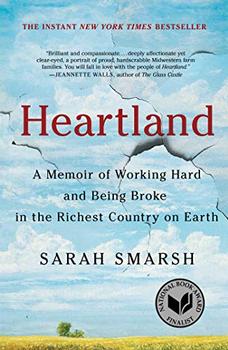Summary | Excerpt | Reading Guide | Reviews | Beyond the Book | Readalikes | Genres & Themes | Author Bio

A Memoir of Working Hard and Being Broke in the Richest Country on Earth
by Sarah Smarsh
Betty was that way, too. When people looked at her, they couldn't believe her actual age. I'd grow up to hear I had those same "good genes." What people didn't see was all the invisible "bad" we inherited, cycles handed down for what I have a feeling was centuries and maybe millennia. They were the negative cycles of poverty. One of them was to be a veritable child and have a baby inside you.
Jeannie wouldn't be able to keep hers a secret for long. Soon after the wedding, she and Nick stopped by a party at Betty and Arnie's farmhouse. Jeannie was one month married and three months pregnant, starting to show a bump. Betty and Arnie were drinking with their friends, the raucous bunch that as a child I would spy on through clouds of cigarette smoke in the dining room: Thin women wearing frosted lipstick and tight jeans. Thick men wearing sideburns and big collars, speaking bits of German without realizing it. On the dining table, more than likely: beer, whiskey, potato chips, a card game called ten-point pitch.
Jeannie stood in the dining room leaning against the wall of built-in oak cabinets that housed china, brittle photo albums, batteries, hammers, poker chips. She tried to cover her belly with her coat.
Betty looked over at her daughter and noticed.
"Are you pregnant?" she shouted. "Oh my God, you're pregnant!" Betty pushed away from the table and shrieked over her embarrassed daughter's belly.
The party sprang into full gear. They were drunk, yelling at Betty, "You're gonna be a grandma!" She was thirty-four years old.
When Betty sobered up, she was upset about the news. Did Jeannie want to get an abortion? It was even legal now.
She did not.
I thus was the proverbial teen pregnancy, my very existence the mark of poverty. I was in a poor girl's lining like a penny in a purse—not worth much, according to the economy, but kept in production
* * *
Jeannie's third trimester carrying me was the hottest summer since the Dust Bowl. The Wichita area reached a hundred degrees for forty-two out of fifty-five days. The heat wave killed seventeen hundred people across the Great Plains—one of the worst natural disasters in U.S. history. But farmers might be the ones most likely to remember it. The drought shriveled crops and caused $20 billion in agricultural losses.
For Jeannie, the summer was one hell of a time to be pregnant. Air-conditioning was a luxury she didn't have.
That August of 1980, my parents brought me home to a tiny red shack they had rented in the same little community where I'd been conceived—a rural cluster of houses separated by wheat fields and long driveways. Mom stayed with me while Dad went back to work farming and building.
Mom and I were alone then, with a rotary phone, a cat, and a black-and-white television. On the TV, local news anchors surely talked about the weather, which my family followed closely, and the upcoming presidential election, about which my family was less concerned. Many of them didn't bother to vote, feeling themselves powerless in a system they suspected was rigged. Mom had recently turned eighteen, though, and intended to wield her new right.
For now, she wielded the cigarettes she had smoked right through her pregnancy, a laundry hamper full of cloth diapers, and a bottle of baby formula. It would have been cheaper to breast-feed, but that would have been the lowest shame of poverty. Mom didn't feel the maternal pangs she'd been assured she would anyhow. She scraped together change for formula. Betty had done the same in the '60s. I might have done the same if I'd had you when I was a teenager, before a mainstream cultural return to breast-feeding reached our place and class. I see so many things differently now. But we did as we had learned.
Excerpted from Heartland by Sarah Smarsh. Copyright © 2018 by Sarah Smarsh. Excerpted by permission of Scribner. All rights reserved. No part of this excerpt may be reproduced or reprinted without permission in writing from the publisher.
Your guide toexceptional books
BookBrowse seeks out and recommends the best in contemporary fiction and nonfiction—books that not only engage and entertain but also deepen our understanding of ourselves and the world around us.